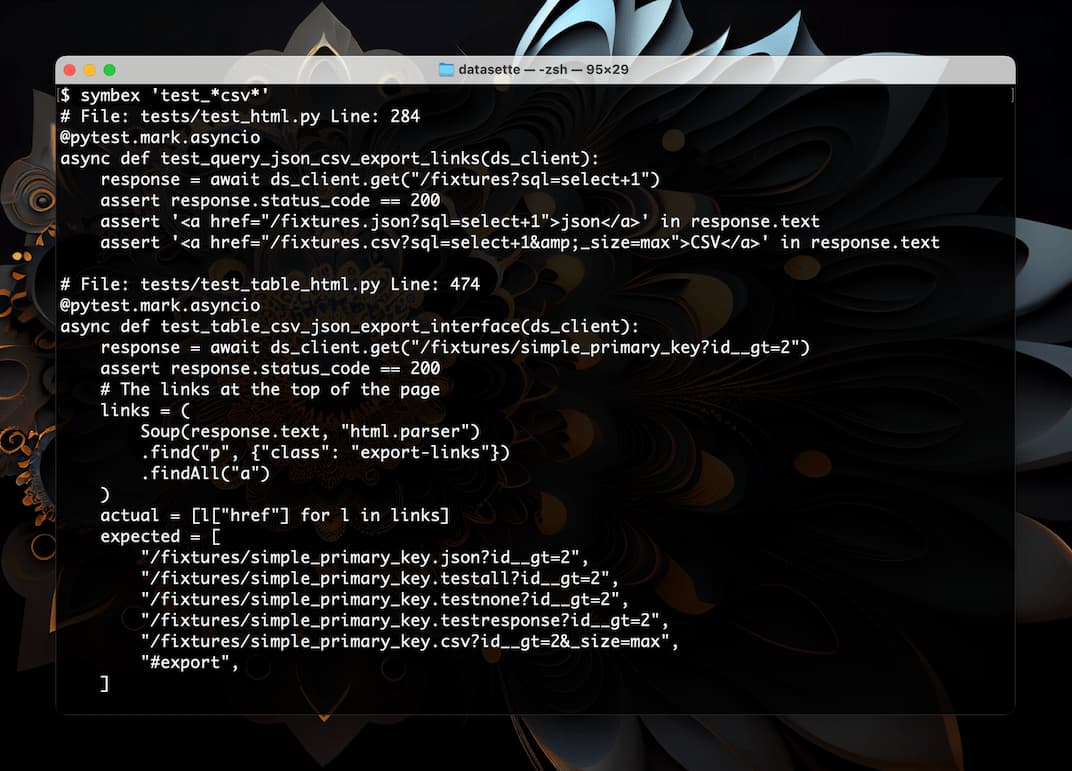5 posts tagged “symbex”
2025
llm-fragment-symbex. I released a new LLM fragment loader plugin that builds on top of my Symbex project.
Symbex is a CLI tool I wrote that can run against a folder full of Python code and output functions, classes, methods or just their docstrings and signatures, using the Python AST module to parse the code.
llm-fragments-symbex brings that ability directly to LLM. It lets you do things like this:
llm install llm-fragments-symbex
llm -f symbex:path/to/project -s 'Describe this codebase'
I just ran that against my LLM project itself like this:
cd llm
llm -f symbex:. -s 'guess what this code does'
Here's the full output, which starts like this:
This code listing appears to be an index or dump of Python functions, classes, and methods primarily belonging to a codebase related to large language models (LLMs). It covers a broad functionality set related to managing LLMs, embeddings, templates, plugins, logging, and command-line interface (CLI) utilities for interaction with language models. [...]
That page also shows the input generated by the fragment - here's a representative extract:
# from llm.cli import resolve_attachment def resolve_attachment(value): """Resolve an attachment from a string value which could be: - "-" for stdin - A URL - A file path Returns an Attachment object. Raises AttachmentError if the attachment cannot be resolved.""" # from llm.cli import AttachmentType class AttachmentType: def convert(self, value, param, ctx): # from llm.cli import resolve_attachment_with_type def resolve_attachment_with_type(value: str, mimetype: str) -> Attachment:
If your Python code has good docstrings and type annotations, this should hopefully be a shortcut for providing full API documentation to a model without needing to dump in the entire codebase.
The above example used 13,471 input tokens and 781 output tokens, using openai/gpt-4.1-mini. That model is extremely cheap, so the total cost was 0.6638 cents - less than a cent.
The plugin itself was mostly written by o4-mini using the llm-fragments-github plugin to load the simonw/symbex and simonw/llm-hacker-news repositories as example code:
llm \ -f github:simonw/symbex \ -f github:simonw/llm-hacker-news \ -s "Write a new plugin as a single llm_fragments_symbex.py file which provides a custom loader which can be used like this: llm -f symbex:path/to/folder - it then loads in all of the python function signatures with their docstrings from that folder using the same trick that symbex uses, effectively the same as running symbex . '*' '*.*' --docs --imports -n" \ -m openai/o4-mini -o reasoning_effort high
Here's the response. 27,819 input, 2,918 output = 4.344 cents.
In working on this project I identified and fixed a minor cosmetic defect in Symbex itself. Technically this is a breaking change (it changes the output) so I shipped that as Symbex 2.0.
2023
Symbex 1.4. New release of my Symbex tool for finding symbols (functions, methods and classes) in a Python codebase. Symbex can now output matching symbols in JSON, CSV or TSV in addition to plain text.
I designed this feature for compatibility with the new “llm embed-multi” command—so you can now use Symbex to find every Python function in a nested directory and then pipe them to LLM to calculate embeddings for every one of them.
I tried it on my projects directory and embedded over 13,000 functions in just a few minutes! Next step is to figure out what kind of interesting things I can do with all of those embeddings.
Weeknotes: Self-hosted language models with LLM plugins, a new Datasette tutorial, a dozen package releases, a dozen TILs
A lot of stuff to cover from the past two and a half weeks.
[... 1,742 words]Weeknotes: symbex, LLM prompt templates, a bit of a break
I had a holiday to the UK for a family wedding anniversary and mostly took the time off... except for building symbex, which became one of those projects that kept on inspiring new features.
[... 1,120 words]Symbex: search Python code for functions and classes, then pipe them into a LLM
I just released a new Python CLI tool called Symbex. It’s a search tool, loosely inspired by ripgrep, which lets you search Python code for functions and classes by name or wildcard, then see just the source code of those matching entities.
[... 1,183 words]